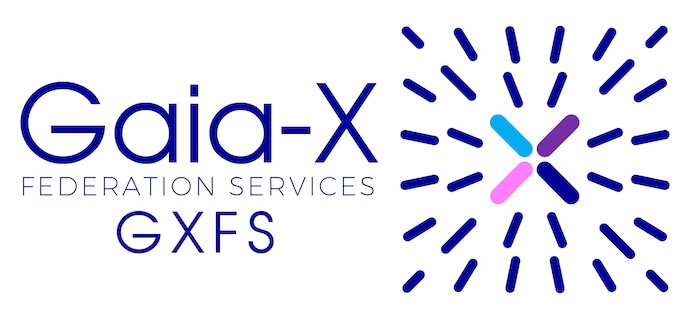For the second time, the leading minds of the Gaia-X scene met in Berlin on 5 and 6 September 2023 for GXFS Connect. While in 2022 the focus was still on the idea behind the initiative and the start of the German funded projects, this year more than 40 speakers discussed concrete progress in the development of a European data ecosystem. In keeping with the motto “Entering the Next Level”, this year’s event was all about technical implementation and a rapidly growing community. In parallel to the main conference programme, 51 programmers and software architects were working on and with the Gaia-X Federation Services (GXFS) code and their Gaia-X implementations. As a reference to the nearly 300 guests from all over Germany, Europe and beyond, the event was held completely in English for the first time.
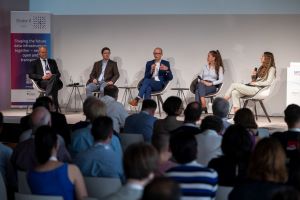
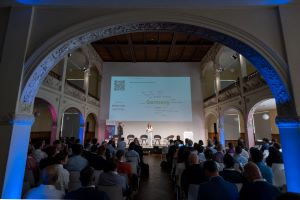
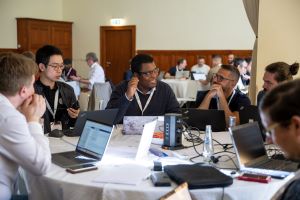
Digital transformation as a joint project
In the digital age, progress means sharing data. “But it’s difficult for two companies to change the world as long as you don’t know whether others will follow suit,” said Ernst Stöckl-Pukall, Head of Division for Digitalisation and Industry 4.0 at the German Federal Ministry for Economic Affairs and Climate Action. “Now Gaia-X needs to build the necessary traction and critical mass to achieve a breakthrough for digital transformation in Europe,” said Harald Summa, Founder and Honorary President of eco – Association of the Internet Industry.
For the host, GXFS Lead and eco Managing Director Andreas Weiss, networking and the exchange of experience and knowledge were therefore the primary goal for this year’s GXFS Connect. “It is not technology, but a vibrant and engaged community that will determine whether the Digital Single Market in Europe will flourish,” Weiss said. “We need data-driven solutions that can scale on an industrial level. To that end, we are now launching data federations across Europe,” Weiss said. “No one can do this on their own, it can only be done together.”
An ecosystem based on trust
“Until now, people and companies have used Internet platforms by storing all their data there – and then calling for help when they lose control. With Gaia-X, we are taking the opposite approach,” said Roland Fadrany, Chief Operating Officer of the Gaia-X Association for Data and Cloud (AISBL), the initiative’s association based in Brussels.
“We see Gaia-X as a platform for trust and transparency,” said lawyer Susanne Dehmel, a member of the management board at Bitkom and a board member at Gaia-X AISBL. But that still has a long way to go in terms of communication, Dehmel said. In Harald Summa’s experience, mistrust is still the standard reaction at the thought of sharing data with third parties. However, Catherine Simonnin, Tech Lead Trust at French telecommunications provider Orange Business, knew that privacy concerns are not a unique German feature: “It’s just as much a typically French problem.”
For Dr. Maria Barros Weiss, Vice President Digital Ecosystem Division at IONOS, trustworthy data exchange must operate on several levels at once: “Users must be able to trust the identity of participants, as well as the reliability of a service and that legal regulations are being adhered to or misuse can be sanctioned.” Such an ecosystem for trusted data spaces gives Europe a competitive advantage in digitized markets, Barros Weiss said.
Thanks to this trust, Susanne Dehmel expected success with Gaia-X, especially in industries where data-based value creation was previously almost impossible. “In healthcare, the legal hurdles to data exchange are a major challenge. But Gaia-X projects like Health-X show that the social benefits of data-based solutions are all the greater there,” said Dehmel.
According to Oliver Süme, a specialist in technology, data protection and IT law, however, European legislation has also evolved: “Just five years ago, there was almost nothing in European law on the subject of data exchange, data economy and creating value from data. An immense amount has happened in this field since then,” said Süme, a partner at Fieldfisher and Chairman of the Board of eco – Association of the Internet Industry.
Can application of law be automated?
According to Professor Dr. Beatrix Weber, Gaia-X does not create a new legal framework for dataspaces, but helps with the technical implementation in the growing EU data law: “Frameworks such as the Gaia-X Federation Services (GXFS) establish standards and provide uniform procedures for mapping law in computer code.” Weber, who conducts research at the Institute for Information Systems at the University of Applied Sciences in Hof, Germany, wants to use Gaia-X to largely automate what has been analogue legal practice: “We want to make lawyers superfluous for large parts of contract processes.”
Pierre Gronlier is also working on this task. At GXFS Connect 2023, the Chief Technology Officer of Gaia-X AISBL reported that automated contracts in the EU are already failing because of a lack of uniform technical language. “What is a contract?” asked Gronlier. “A contract can be a coin I put into a machine or a document I have to sign by hand before buying a property. If we want to automate data-based transactions, we need uniqueness,” Gronlier said. That’s why he and his team are developing, among other things, a legal canon of terms, a so-called ontology, which computer processes can draw on without contradiction.
For cybersecurity expert and eco board member Professor Dr. Norbert Pohlmann, even “trust by design” is not enough on its own to get companies and citizens to embrace the new data economy: “We need well-known and trustworthy players to lead the way as role models. This applies to government institutions as well as to business,” said Pohlmann, who heads the Institute for Internet Security at the Westphalian University of Applied Sciences.
GXFS study at halfway point for funded projects: GXFS serves as kickstarter, but needs more community work
The Gaia-X funded projects, and their consortium members in particular, are currently assuming a role model function in their respective sectors. At GXFS Connect 2023, Professor Dr. Jens Böcker from the consulting firm Böcker Ziemen Consulting presented the results of the second study on the implementation of Gaia-X Federation Services. The survey, commissioned by the German GXFS project office, documents progress compared to the previous year’s study.
The results: In mid-2022, most projects were still busy with organisational onboarding. In the meantime, architectures and business models have been piloted, the relevant GXFS components have been identified, and projects are starting to technically develop and code the Gaia-X data spaces into life. Most prototypes are at an early laboratory stage, while two funded projects in the anonymously conducted survey indicated that they were already testing their solutions in the field.
The survey results also revealed a high level of satisfaction with the communication around the Gaia-X Federation Services. In addition, they valued the interactive offers as part of the community work on the GXFS such as tech workshops, hackathons, conferences and trade fair presences. In addition to technically sound information, offers for networking were at the top of the wish list for the future.
FOSS community becomes key factor
One difference from the GXFS Connect 2022 marked the role of programmers and software architects: There was no panel that did not emphasize their supporting role for the upcoming European data ecosystem. In parallel to the conference, the developers exchanged functional requirements and technical solutions from the funded projects in a separate GXFS Tech Workshop.
The importance of the community for Gaia-X is all the greater because the majority of the technology is being developed as free and open-source software. The development path for federated data ecosystems in Europe is therefore not determined by a single software manufacturer or platform provider, but by the community of contributing experts and companies.
Accordingly, Christian Schmitz, Director OpenSource at Plusserver, reinterpreted the abbreviation FOSS to Freedom through Open Source Software instead of Free and Open Source Software. With Gaia-X, Europe is preserving freedom from technological dependence in a central field of innovation. “Trust and open source are related: Trust comes from independence and a transparent development process,” Schmitz said.
That’s exactly what Boris Baldassari, senior software engineer at the Eclipse Foundation, wants to ensure. This year, the GXFS project office handed over Gaia-X Federation Services to the care of Europe’s largest open-source foundation. There, the community continues to develop the Gaia-X Federation Services under the project title Cross Federation Services Components (XFSC).
Together with the project leads Lauresha Memeti (eco), Steffen Schulze (T-Systems International) and Cristina Pauna (Gaia-X AISBL), Baldassari wants to guarantee the basic values typical of every Eclipse project: “We apply openness and transparency across all development steps as well as a consistent meritocracy. This means: no privileges, but genuine appreciation for the contributions of the developers.”
Open-Source Maturity & Community Skills
What about the maturity of the companies involved in terms of open-source development? “XFSC is still very fresh. Everything is ready, we’ll see,” Baldassari said diplomatically. Cristina Pauna, Program Manager for the Open-Source Community at Gaia-X AISBL, has had more experience with the Gaia-X scene. “On a scale of one to five, we’re about in the middle,” the community manager said. “The fact that many contributors are still inexperienced with open-source development, also shows that we are attracting many companies to participate for the first time,” Pauna said. That makes support from the Eclipse Foundation all the more important, she added.
Fabian Scheidt, Tech Delivery Subject Matter Expert at Accenture Industry X, also experienced that you first have to grow into community work. His team for the Gaia-X 4 ROMS lighthouse project is working on a data space for self-organising transportation systems, where the next ride finds the passenger instead of the other way around. “Working on the Gaia-X code, you sometimes think, ‘Am I too stupid, or is this a bug?’ If we find a bug, we play our solution back to the community. That’s how open-source works!” said Scheidt. His advice to those getting involved for the first time: “Don’t think you’re the best. Openly ask for help and accept it!“
Kai Meinke, Co-Founder & Business Lead at deltaDAO AG as well as Lead Open-Source Software Community at Gaia-X AISBL, drew a positive conclusion for Gaia-X’s technological progress: “Technology doesn’t stop us anymore, it’s here. Now it’s a matter of collaboration, of bringing the right people together.”
Listening, networking and thinking outside the box
For Dr. Christina Schmidt-Holtmann, the national Gaia-X Hubs play a key role in community building: “We need an awareness of the needs of the different industries.” The Head of Divison for Data Availability, Digital Sovereignty, SPRIND at the German Federal Ministry for Economic Affairs and Climate Action, sees the hubs as the most important contact points for all companies looking for data-based solutions and wanting to benefit from the development around Gaia-X. “Entering the Gaia-X world often seems foreign and challenging. This is where the national Gaia-X Hubs offer orientation and the right contacts,” said Schmidt-Holtmann. In the direction of the economy and especially for medium-sized businesses, the Gaia-X Hubs are the best entry into the community, she recommended to the audience.
In parallel to many other speakers, Hub leaders Francisca Rubio (Spain), Georg Hahn (Austria), Peter Verkoulen (Netherlands) and Jan Fischer (Germany) also emphasized the importance of cross-country collaboration between national organisations. “As a jump-start to building young country Hubs and developing a functioning data ecosystem with strong, data-driven GDPR-compliant business models for all of Europe,” said Jan Fischer, Lead of the Gaia-X Hub Germany.
“Europeans underestimate themselves”
Beyond all the policies, standards, blueprints and projects, a new spirit ran through panels and conversations in Berlin. Peter Verkoulen from Gaia-X Hub The Netherlands perhaps summed it up best: “With Gaia-X, a new digital culture is emerging in Europe, a shared understanding of how we solve problems.”
Visitors from other regions of the world were unable to understand the fear that Gaia-X would appear overly complex and hermetic to outsiders. For IT expert Maharshi Suchak, Co-Founder and Chief Product Officer at smartSense Consulting Solutions in Ahmedabad, India, Gaia-X is an open book: “The technical documentation is excellent! After careful reading, Gaia-X is actually quite simple and thought-compelling. Europe is a world leader in this field. We want to be part of it and make tomorrow’s digital world a little better.”
Where will Gaia-X and the GXFS be in a year’s time?
Looking ahead to next year’s progress, eco project manager and presenter Emma Wehrwein hoped the development of the tool world for Gaia-X would gain momentum. “I hope a year from now the community tells us what needs to be done to make Federation Services better and better,” Wehrwein said.
Her colleague Vivien Witt, eco project manager and moderator, looked ahead to the next year from a user perspective: “I’d like to see a lot of user-friendly portals and lots of different catalogue implementations for new data services.“
Lauresha Memeti, technical project manager at eco and moderator, emphasized how much a thriving community needs face-to-face encounters: “In the digital world, we exchange ideas virtually via e-mails and video screens. It’s all the more important to meet and get a real sense of the whole picture. Events like GXFS Connect are key to us moving forward and understanding each other better.“
In this respect, the wishful headline of host and eco managing director Andreas Weiss does not have to wait until five years from now to be read on the front pages: “Europe is back on track in the digital space!“
Andreas Weiss & Thomas Sprenger
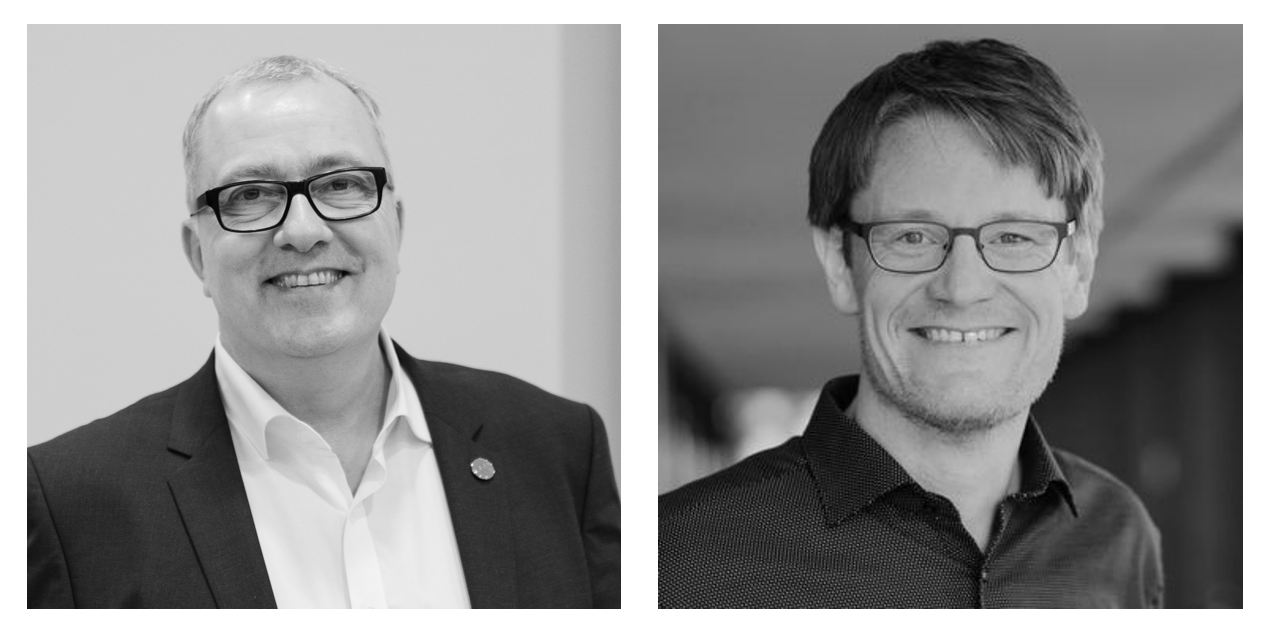
Every month on LinkedIn and www.gxfs.eu
Every month, we will guide you through the world of Gaia-X on LinkedIn and www.gxfs.eu. Our analyses and interviews give background and insights into how a European initiative and its collaborators want to create an ecosystem for value creation from data.
Heading this series of articles is Andreas Weiss. As Head of Digital Business Models at eco as well as Director of EuroCloud Deutschland_eco, Andreas Weiss is well connected and familiar with the Internet and cloud industry in Europe. He brings his experience to Gaia-X Federation Services (GXFS), whose project teams are responsible for the development of Gaia-X core technologies. Led by eco, the GXFS-DE project is also funded by the German Federal Ministry of Economic Affairs and Climate Action and is in close exchange with the Gaia-X Association for Data and Cloud (AISBL). Weiss is supported on this blog by Thomas Sprenger, an author and copywriter who has been writing about the digital transformation for twenty years.
